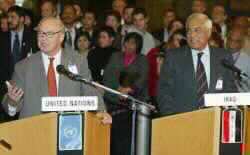HIGHLIGHTS: Iraq Shows Good Faith by Handing over Long Overdue Information about Nuclear Facilities|| U.S. Attempts to Win Support for its Approach Continued to Face Resistance from France, Russia and China||White House Says Would Welcome the Assassination or Exile of Saddam Hussein by His Own People||U.S. Threatens 'Thwart Mode' if U.N. Inspectors Prepare to Return to Iraq without Fresh Instructions||Bush Expresses Deep Reservations with Alternative Congressional Resolution Describing it as Weak|| STORY: Iraq agreed on Tuesday to let U.N. arms inspectors back in, possibly within a fortnight, but the United States rejected any resumption of inspections before a tough new Security Council resolution was in place.
Iraqi arms experts and U.N. weapons inspectors struck a deal on the second day of talks in Vienna as the Iraqis, under pressure from the threat of a U.S.-led invasion, made a show of good faith by handing over long overdue information about nuclear facilities.
"The Iraqi representatives declared that Iraq accepts all rights of inspection provided for in all the relevant Security Council resolutions," chief U.N. weapons inspector Hans Blix told reporters after the meeting.
But in Washington Secretary of State Colin Powell quickly poured cold water on the deal, insisting a watertight resolution was needed first.
"The United States will continue to pursue a new U.N. resolution," he told reporters. "We will not be satisfied with Iraqi half-truths, or Iraqi compromises or Iraqi efforts to get us back in the same swamp ... Pressure works, we will keep it up."
The draft resolution which the United States wants the Security Council to adopt would delay the return of inspectors until Baghdad provides a list of any nuclear, germ or chemical weapons and related material.
The draft, seen by Reuters on Tuesday, authorizes a military strike and is now under discussion by the five permanent Security Council members with veto rights -- the United States, Britain, France, Russia and China.
U.S. ATTEMPTS TO WIN SUPPORT FOR ITS APPROACH CONTINUED TO FACE RESISTANCE FROM FRANCE, CHINA & RUSSIA
The proposed measure says Iraq, within 30 days of adoption of the resolution, has to provide a "complete declaration" of all its programs for weapons of mass destruction.
This declaration has to be submitted "prior to the beginning of inspections," the draft says.
U.S. attempts to win support for its approach continued to face resistance from France, Russia and China over language authorizing military action in retaliation for any infraction by Baghdad.
Iraq has already rejected the U.S. draft resolution, details of which have been widely leaked, and the United States has made clear it will act to disarm Iraqi President Saddam Hussein with or without Security Council approval.
In Baghdad, Iraq said it would not be intimidated into accepting a new Security Council resolution by threats of war.
White House spokesman Ari Fleischer said Washington would welcome the assassination, or exile, of Saddam by his own people. "The point is that if the Iraqis took matters in their own hands, no one around the world would shed a tear," he said.
Fleischer said later he was making a rhetorical point and not a new statement of administration policy.
U.S. THREAT OF THWART MODE IF BLIX GOES BACK TO IRAQ WITHOUT FRESH INSTRUCTIONS
A senior State Department official said the United States would go into "thwart mode" if Blix prepared to go back to Iraq without fresh instructions.
Blix said in Vienna that there was a "big difference" in Iraq's willingness to cooperate compared to 1998, when U.N. inspectors quit the country after repeated disputes with Saddam's government over access to suspected arms sites.
The main bone of contention was "presidential sites," and Blix said the deal struck on Tuesday did not change existing rules on access to these -- rules which the United States specifically wants to abolish in its proposed new resolution.
Blix said the Iraqis had assured him they would cooperate fully, though this would be put to the test when inspectors returned, possibly in mid-October.
The Iraqi delegation leader, Saddam's technical adviser Amir al-Saadi, said he was happy with the agreement and that the talks were businesslike and focused.
He said Baghdad would ensure that sensitive locations like the defense and interior ministries -- not covered under the agreement on the presidential palaces -- were open to inspectors and that they got speedy access.
"We will take the measures that will cancel the need for a waiting period and getting approval," he said.
The Iraqi delegation handed over four CDs which they said contained information on the status of so-called dual-use nuclear equipment that could be used to build arms as well as for civilian purposes.
Blix said the data had not yet been analyzed, but that it would help them choose initial inspection sites.
In Washington, Bush, seeking broad-based support from Congress for a possible attack on Iraq, denounced a compromise resolution drafted on Capitol Hill that limited the conditions for such an attack, saying it would "tie my hands."
Bush told reporters the draft congressional measure, aimed at securing broad support, would be weaker than 1998 legislation that declared U.S. policy for Iraq included "regime change."
Persistent worries over a conflict in Iraq helped push world oil prices toward 19-month highs before they dipped slightly on news of the U.N. inspectors' imminent return.
PHOTO CAPTION
Special Adviser to the Iraqi President Amir Al Sadi (R) and U.N. chief arms inspector Hans Blix address a news conference, after a meeting at Vienna's U.N. headquarters, October 1, 2002. Iraq agreed to a resumption of U.N. weapons inspections, with an advance team of inspectors due in about two weeks, U.N. and Iraqi negotiators said. (Leonhard Foeger/Reuters)
- Author:
& News Agencies - Section:
WORLD HEADLINES


 Home
Home Discover Islam
Discover Islam Quran Recitations
Quran Recitations Lectures
Lectures
 Fatwa
Fatwa Articles
Articles Fiqh
Fiqh E-Books
E-Books Boys & Girls
Boys & Girls  Women
Women










